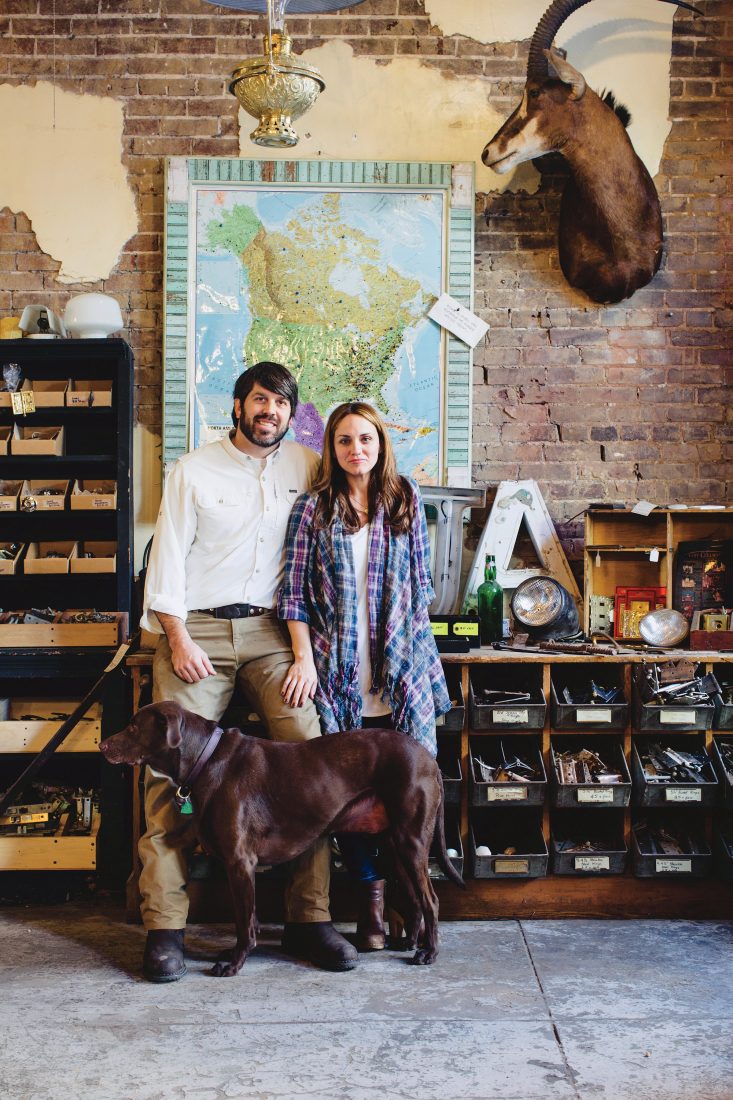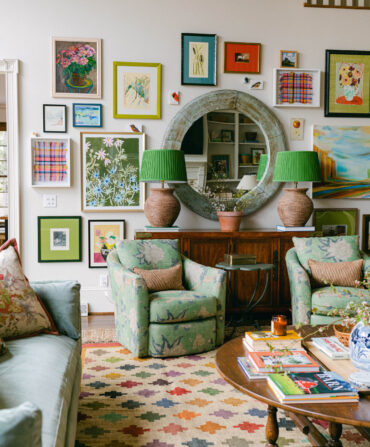Despite its resemblance to an architectural graveyard, Southern Accents Architectural Antiques in tiny Cullman, Alabama, is not where bits and pieces of old homes and buildings come to be laid to rest. They come here to be reborn.
“I love watching someone get excited about something that could have ended up in the trash,” says the shop’s co-owner Garlan Gudger, Jr., a big guy with an even bigger grin who is equal parts salvage expert, preservationist, and treasure hunter.

Photo: Graham Yelton
Nineteenth-century white-oak newel posts.
Walk through the doors and, after a friendly greeting from Garlan Jr. or one of his team offering up a cold, glass-bottle Coke, you’re met by a row of reclaimed doors, edges of walnut and cherry peeking from behind pine and oak. A row of mantels—simple, ornate, painted, and not—lines the succession of doors. Balusters stand near a staircase; sunlight sets squares of stained glass aglow. Bins and boxes overflow in a jumble of pulls, hinges, and hooks while stacks of tiles shimmy and clink when the door closes hard. Chandeliers of various sizes and styles illuminate the scene. Wrought-iron gates dot an adjacent lot. Saved from structures often more than a century old, these vintage architectural elements come from early 1900s farmhouses in Alabama, 1880s estates in South Carolina, schoolhouses in Chicago, New York City brownstones. “Our mission is rescuing these things, giving them a second chance,” Garlan Jr. says.
But five years ago this April, when a massive tornado tore through Cullman, damaging much of downtown, it was Southern Accents that suddenly found itself with an uncertain future. The F-4 twister took out the store’s windows and blew in tree limbs, bricks, asphalt shingles, glass, dirt, and other debris. It ripped off part of the roof. Garlan Jr. and his wife and fellow owner, Heather, had to decide whether to pick up and keep going or shut what was left of the front doors and walk away. “I knew I’d never be fulfilled doing something else, so we got back to it,” he says. He encouraged others to do the same and put his expertise to good use aiding friends and neighbors, leading a group of twenty-five people, including his wife and members of his Southern Accents crew, on daily cleanup and renovation missions. “We’d meet at my house, and go do whatever needed doing, boarding up windows, putting tarps on roofs,” he says.
The family’s history of snatching architectural salvage from the brink of oblivion stretches back to 1969, when Garlan Jr.’s father, Dr. Garlan Gudger, Sr., founded Southern Accents. Then a high-school football coach and teacher, Garlan Sr. started the business as a side gig. “I saw folks throwing out these beautiful pieces, and I wanted to save them,” he says.

Photo: Graham Yelton
A stockpile of reclaimed doors.
For three decades that’s what he did, with his son often at his side. “Some fathers and sons bond over hunting or fishing,” Garlan Jr. says. “We bonded over old stuff.”
As much as he enjoyed salvaging, when Garlan Jr. left for college, he had no plans to return to Cullman full-time. In 1999, though, soon after he graduated, his dad’s failing health meant come back and help or see the shop close, so he quit a job he’d just accepted with a contractor in Dallas and headed home. “I fell back in love with this work,” he says.
Today, the love affair is as strong as ever. Post-storm, the business doubled in size and sales to include more than 45,000 square feet of shop space, iron lots, a mantel warehouse, an old gym (about a mile from the shop) jam-packed with reclaimed wood, and a restoration shop, which Garlan Jr. added when he took over. Here veteran artisans revive relics in need of TLC as well as build custom pieces from salvaged materials. All together, they make Southern Accents the largest one-stop-shop architectural antiques business in the South.

Photo: Graham Yelton
A restored crystal chandelier, circa 1910.
The growth thrills Garlan Sr. “I can’t describe what it’s like to see where my son has taken this,” he says. Part of it is good timing, with interest in pre-mass-production craftsmanship and quality on the upswing. Southern Accents’ “sets,” creatively assembled with timber, tin ceiling tiles, shutters, and more, give a sense of place to events around the South (such as Southern Makers, a series of Alabama fairs highlighting local artists, craftsmen, and chefs; and Sloss Festival, a music and arts celebration set amid the smokestacks of Birmingham’s Sloss Furnaces). The Alabama designer Billy Reid continually turns to Garlan Jr. for backdrops for his New York fashion shows as well as elements in his stores. “I started buying from him about twelve years ago,” Reid says. “He’s one of the best in the country at finding, gathering, and preserving these things. He truly pours himself into his work.”
For Garlan Jr., that sort of praise is just a bonus. “This is what I was born to do,” he says. “If I went bankrupt tomorrow, I’d start all over and do it again.”








